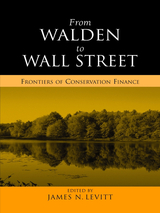
In the absence of innovation in the field of conservation finance, a daunting funding gap faces conservationists aiming to protect America's system of landscapes that provide sustainable resources, water, wildlife habitat, and recreational amenities. Experts estimate that the average annual funding gap will be between $1.9 billion and $7.7 billion over the next forty years. Can the conservation community come up with new methods for financing that will fill this enormous gap? Which human and financial resources will allow us to fund critical land conservation needs?
From Walden to Wall Street brings together the experience of more than a dozen pioneering conservation finance practitioners to address these crucial issues. Contributors present groundbreaking ideas including mainstreaming environmental markets; government ballot measures for land conservations; convertible tax-exempt financing; and private equity markets.
The creativity and insight of From Walden to Wall Street offers considerable hope that, even in this era of widespread financial constraints, the American conservation community's financial resources may potentially grow dramatically in both quantity and quality in the decades to come.
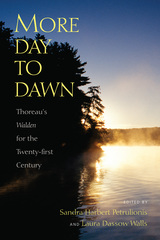
Thoreau asserted that the leaves of the earth's strata were not page upon page to be studied by geologists and antiquaries chiefly, "but living poetry like the leaves of a tree." The continuing vitality of Walden shows that it, too, is not a fossil but a living book, still putting out green leaves of insight.
Each decade since Walden was published in 1854 has seen the world grow more crowded and less "simple." What, in our consumerist, speed-of-light, hypermediated world would Thoreau have found worth pursuing? How would he structure his life so as to shut out the phones ringing, the cars honking, the litter trashing his beloved haunts? Readers still seek answers to such questions by picking up their dog-eared copy of Walden and immersing themselves yet again in its pages. Students convince us that this book still holds the power to change lives. These essays are written with the expectation that Thoreau in the new century can help us realize that there are more lives to live and more day to dawn—that "the sun is but a morning star."
Contributors include Nina Baym, Robert Cummings, Robert Oscar López, Lance Newman, H. Daniel Peck, Dana Phillips, Larry J. Reynolds, David M. Robinson, William Rossi, Robert Sattelmeyer, Sarah Ann Wider, and Michael G. Ziser.
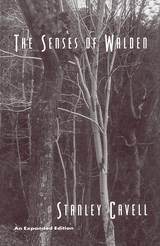
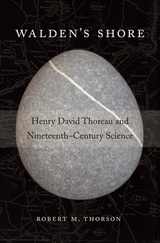
"Let us settle ourselves, and work and wedge our feet downward," Thoreau invites his readers in Walden, "till we come to a hard bottom and rocks in place, which we can call reality." Walden's Shore explores Thoreau's understanding of that hard reality, not as metaphor but as physical science. Robert M. Thorson is interested in Thoreau the rock and mineral collector, interpreter of landscapes, and field scientist whose compass and measuring stick were as important to him as his plant press. At Walden's climax, Thoreau asks us to imagine a "living earth" upon which all animal and plant life is parasitic. This book examines Thoreau's understanding of the geodynamics of that living earth, and how his understanding informed the writing of Walden.
The story unfolds against the ferment of natural science in the nineteenth century, as Natural Theology gave way to modern secular science. That era saw one of the great blunders in the history of American science--the rejection of glacial theory. Thorson demonstrates just how close Thoreau came to discovering a "theory of everything" that could have explained most of the landscape he saw from the doorway of his cabin at Walden. At pivotal moments in his career, Thoreau encountered the work of the geologist Charles Lyell and that of his protégé Charles Darwin. Thorson concludes that the inevitable path of Thoreau's thought was descendental, not transcendental, as he worked his way downward through the complexity of life to its inorganic origin, the living rock.
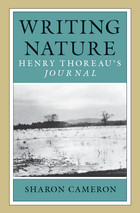
READERS
Browse our collection.
PUBLISHERS
See BiblioVault's publisher services.
STUDENT SERVICES
Files for college accessibility offices.
UChicago Accessibility Resources
home | accessibility | search | about | contact us
BiblioVault ® 2001 - 2024
The University of Chicago Press









